
ORDER
The
New Work of
Dogs: Tending to
Life, Love, Family
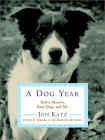
ORDER
A
Dog Year:
Twelve Months
Four Dogs and Me

ORDER
Dogs:
A Startling
New Understanding
of Canine Origin,
Behavior & Evolution
  
READ A
REVIEW OF
Ray &
Lorna Coppinger's "Dogs"
READ MORE
ABOUT
Dog
Origins
  

ORDER
The
Canine
Good Citizen
or visit our
BookShelf
POPULAR DOG &
TRAINING BOOK

ORDER
The
Dog
Whisperer

ORDER
Family
Dog

ORDER
The
Art of
Raising A Puppy

ORDER
The Last
to Great Race
 ORDER ORDER 
Valuable
Dog DVDs
Shop here
 ORDER ORDER

Helpful
Dog Videos
Shop Here
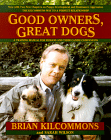
ORDER
Great
Owners
Great Dogs
or visit our
BookShelf

ORDER
Peak
Performance
or visit our
BookShelf

ORDER
Don't
Shoot
the Dog!

The
Canine
Good Citizen
or visit our
BookShelf

LAUGH
at Comic
Canine Cartoons
Buy @
DogShops:
Dog books
Dog posters
Dog magazines
Dog health care
Dog toys & treats
 Click Here! Click Here!  |
| At the time the dog
year began, I had two Labs, Julius and Stanley. They were gorgeous, wonderful companions,
the perfect writing dogs. They loved to doze near the computer. In fact, they loved to
doze anywhere. I never really worked
much with them, to my regret, and didn’t even quite grasp the power of seeing a
working dog work until I got the Border Collies, first Devon and then Homer. |
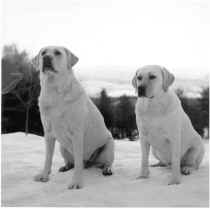
Julius and Stanley
|
My Labs were mostly housepets and
companions. I must confess I didn’t give them a chance to work, and they were so
mellow they didn’t seem inclined to do much more than hang around. But that was a
mistake and shortcoming on my part. I can’t imagine having a non-working dog again.
Julius and Stanley were wonderful in other
ways though, the most sweet-tempered loving and generous creatures. Whenever anybody in my
town had a small child, they brought him or her over to meet Julius and Stanley to get to
know dogs. They were snow white Yellow Labs, from a show line.
Barbara: WorkingDogWeb.com
readers are interested in active dogs of all kinds, whether hunting or herding dogs such
as yours or agility or sled dog racing competitors and more. Your portrait of two very
different types of breeds -- your Labs and Border Collies -- highlights the remarkable
working instincts of different dog breeds. Would you comment on some things you’ve
learned about this area of dog behavior?
Jon: It’s been quite a
revelation to see the power of the working dog, especially when the owner (me) goes to
some lengths to give the dog an opportunity to work. You really see why dogs and people
got together thousands of years ago, and why they have such a powerful relationship. Now,
it makes me a bit sad to see all these proud gorgeous working dogs who never get to work.
| I see the trust and
communications that evolve in a working relationship, and it’s extraordinary. The
first Border Collie I got – Devon – was in bad shape, needy, high-strung,
fearful and very frightened around work situations. His stress was off the chart. I took him to dog trainer and
behaviorist and sheepherder named Carolyn Wilkie at Raspberry Ridge in Bangor,
Pennsylvania. I became deeply absorbed in training, herding sheep and geese, and
even therapy work. |
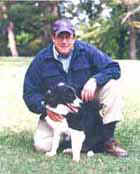
Jon and Devon
Photo Credit: © James
Lattanzio / Villard
|
Once Devon began to work, he slowly
was transformed. We shepherd, clear geese, do therapy work and do all sorts of tasks for
farmers near my upstate New York cabin. We’ve herded cattle, goats, and shy and
aggressive sheep. Great fun. I’ve really learned what a working dog can do, and my
two Border Collies – Homer was the second one I got – taught me and are still
teaching me. I had no idea what working dogs could really do, and was amazed at how little
I really knew about dogs at all. The kind of training involved here takes one to another
level of trust, communications and closeness.
Barbara: A great debate is
raging in the dog world about the two opposing dog training approaches -- the negative
discipline and correction approach and the positive reinforcment and praise approach.
Given your dramatic experiences with Devon, who came to you after puppyhood, do you think
the praise and positive reinforcement method would ever have been enough to civilize
Devon?
Jon: I’ve taken a bunch
of training courses, and tried various approaches with Devon, from shouting, chasing and
sharp corrections to positive reinforcement. The dog world, like the other one, is filled
with politics, and I resist the temptation to totally embrace any philosophy 100 per cent.
Now that I actually have taken training courses, and after the intense experience of
herding and working with these two Border Collies, I do embrace the positive approach. But
I can’t say I embrace it under all circumstances without reservation. Dogs, people,
environments and circumstances vary.
I am, for example, not all positive
when it comes to streets or behavior around children. I believe in clarity, and certainly,
in clear, repeated reinforcement of appropriate and desired behavior. But we humans are
complex. We live pressured, harried lives and it seems unreasonable not to recognize that.
Sometimes we will lose it, and there are some dogs – I have one – with powerful
drive, instincts and interests, and there are times (as when he tries to herd school
busses) when I have to make it clear to him that this behavior is unacceptable to me. He
seems to notice and respect that.
I don’t do it in a violent way,
of course. Otherwise, I find that positive reinforcement works well in most situation. And
I am viscerally uncomfortable with the arsenal of weapons – chains, electronic
collars, etc. -- that people employ against dogs in lieu of training. Working with dogs is
itself a wonderful training tool, in that it forces you to learn about what you are doing.
And the positive reinforcement style trainers have taught me to shut up, stop shouting,
make myself clear, and to build my training on a foundation of love, trust and positive
reinforcement.
But I think we all have to make
individual judgements... what we, our voices and personalities and dispositions, are like,
what the dog is like, what the environment and dangers and pressures are like. I
don’t really like all encompassing approaches. I think positive reinforcement is a
great direction – it’s my direction – but when Devon nosed into a baby
stroller last week to try and steal a Zwieback cracker from an infant’s hand, I was
decidedly non-positive in my command. And he hasn’t done it again. I think correction
and positive reinforcement trainers each have something to bring to the table, and I think
the wise dog owner takes a bit from each.
Barbara: When you turned 50,
you bought your cabin in New York and spent some time thinking about life and change.
Eventually you wrote your book, Running to the Mountain: A Journey of Faith and
Change. Did you agree to take Devon, the young Border Collie without a home, into
your life in part as a result of your experiences on the mountain? Were you seeking change
in your life?
Jon: I’m not sure why I
took Devon. I’m just glad I did. I had plenty to do, and two dogs I loved. I’ve
always been fascinated by the Border Collie, and with my daughter off in college, I had
the time and opportunity (I work at home in New Jersey, have a house in upstate New York)
to do right by the breed. I had no idea what I was getting into. He jumped through
windows, dug holes in the yard, opened the refrigerator and hid food in the house, and was
generally bonkers. But he has a great heart.
He wasn’t treated properly, and
was needy and psychically battered. The Lost Boy in him touched the Lost Boy in me, and I
think I also wanted to go to the next level in dog comprehension and knowledge. Boy, did
I. I had no idea that the year would be filled with so much happiness and tragedy, dog
wise. Or that I had so much to learn and that it would be such hard work – hundreds
of hours, really. We even ended up changing his name to Orson because the trainers noticed
he was so command-averse to his given name.
| But I surely don’t
regret it. I believe in change, and I think the relationship between a person and a dog
– most especially a working dog – can be very spiritual. My wife still
can’t figure out why I took Devon, but it was one of the best things I ever did. We
had faith in one another, loved one another and got each other to work. What could be more
powerful than that? He even turned me into a dog writer! My next book, "The New Work of
Dogs," is about dogs also, especially the emotional relationship increasingly
developing between disconnected people and the dogs they turn to for emotional support,
for better and worse. |
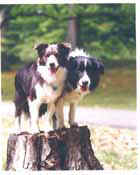
Homer and Devon
the Border Collies
Photo Credit: © James
Lattanzio / Villard
|
Barbara: In preparing
this interview, I read quite a bit about your book called Geeks: How Two Lost Boys
Rode the Internet Out of Idaho which is the story of Jesse Dailey and his friend
Eric Twilegar. In a sense, I saw some parallels between Jesse and your first Border
Collie, Devon, as both were misfits or outcasts of a sort. Do you like writing about
misfits and outcasts?
Jon: You are very perceptive.
Devon is to dogs what Jesse is to teenagers..They are both Lost Boys, as I was as a kid,
and I am drawn to the human and canine form. Although Devon – my wife calls him
"Satan’s Spawn" -- was vastly more rebellious, stubborn and difficult than
Jesse. And that’s saying something.
Barbara: Based on your
experiences, what would you say to families about bringing a dog into their home?
Jon: I think it’s
crucial that people learn more about dogs before they acquire them. Critical that they get
dogs from the right places, vital that they train them and – this is new – very
important that the idea of working with a dog be kept alive and nourished. I am truly
appalled at how thoughtlessly people get dogs. My town is filled with gorgeous, huge
hunting dogs and working breeds who never get to work. I’ve had owners of Border
Collies come up to me and express surprise that they are herding dogs.
I am constantly running into
powerful Labs and Retrievers who are overweight, frantic and neurotic because people got
them without much research or willingness to work. Much as I love dogs, it’s almost
too easy to get them. I think training is critical, and people really need to understand
when they get a puppy for their kid for Xmas, that that kid is likely to lose interest two
months later, and somebody needs to bond with the dog, train it, exercise it and where
appropriate, find some work to do with it, from therapy work to agility to whatever.
We are almost on a collision course
in America. Millions of dogs, and no place for them to run freely, and a plethora of new
and restrictive laws keeping them from going to places, working or getting to know people.
It’s disturbing how many aggressive, neurotic and unhealthy dogs I meet. That often
leads to abuse, as people get dogs, are surprised by their needs and instincts and turn
ugly in trying to control them in improper ways (I’m not referring to corrections).
Dogs are mass-marketed on TV all the time as part of the American dream, like a big car or
a green lawn. I fear many people have no idea what dogs are like. They are not like
people, don’t have human emotions, etc. But the readers of this site know that.
Barbara: Dogs have been part
of your life since fourth grade, as you explain in the introduction to your new book, A
Dog Year: Twelve Months, Four Dogs and Me. Considering all the dogs you’ve
had over the years, can you describe what dogs have meant to your life... the most
important meanings?
Jon: Dogs make me a better
human. They make me more loving, less lonely, more patient, less angry. They get me out
and moving around, which is healthy. I love their loyalty and integrity. I now especially
love the proud, instinctive great heart of the working dog. Seeing my dogs break into an
outrun a half-mile away from me and go round up some sheep in the distance, bring them to
me, tongues hanging on the ground (the dogs that is), radiant with joy, being able to
flick my wrist and have a dog lie down a quarter mile away. It’s amazing, really, and
how wonderful a gift to me.
I feel the immense satisfaction,
trust and pride that a good working dog brings to a receptive owner. I can’t imagine
life without a dog. I don’t think dogs are substitutes for people, but I must confess
I often find them more reliable. I am so proud that I did the work to have two fine –
and now, titled! – working dogs, and that we are doing so many different kinds of
work. We have cleared geese out of little league parks, comforted stroke victims and
people in nursing homes, and of course, the most fun of all, regularly care for a flock of
sheep nearby. I’m a lucky dog owner.
Barbara: Is there anything
else you would like to share with visitors to the WorkingDogWeb.com site who read this
review?
Jon: I think dogs are
metaphors, for life of course, Our dog stories and experiences – mine, for sure
– are about much more than dogs. They are about loss and gain, growth and change,
love and trust. One thing about my book, and the thing I see again and again in the
relationships between true dog people and their dogs: they hang in there together. They
don’t quit on one another. That’s the true story of my relationship with Devon.
We didn’t give up on one another, and we are both much enriched by it.
I feel as if lifetime of dog
experiences was compressed into a single year, and I wanted to share it. Please feel
free to e-mail me at jonkatz3@comcast.net about
dogs in general or about the book, and thanks for this opportunity.
Jon Katz was interviewed via e-mail by
Barbara Petura, Webmaster, WorkingDogWeb.com
in early April 2002. Thank you, Jon!
 Click
here to order A Dog Year Click
here to order A Dog Year
Read our review of A Dog Year by Jon Katz
with a brief biography and listing of some of his other books.

|
